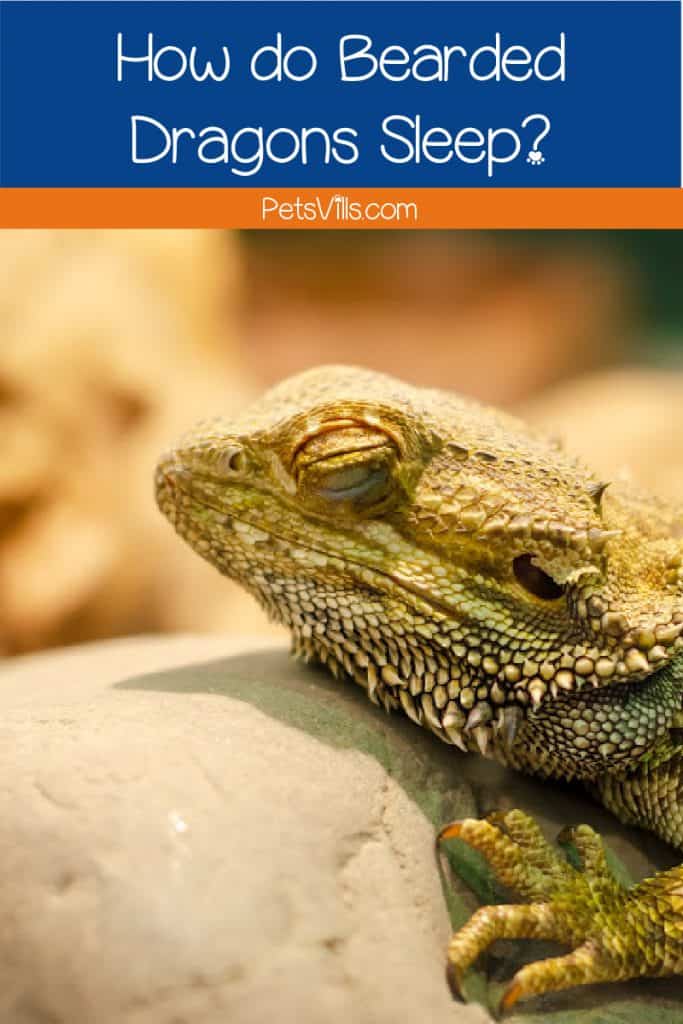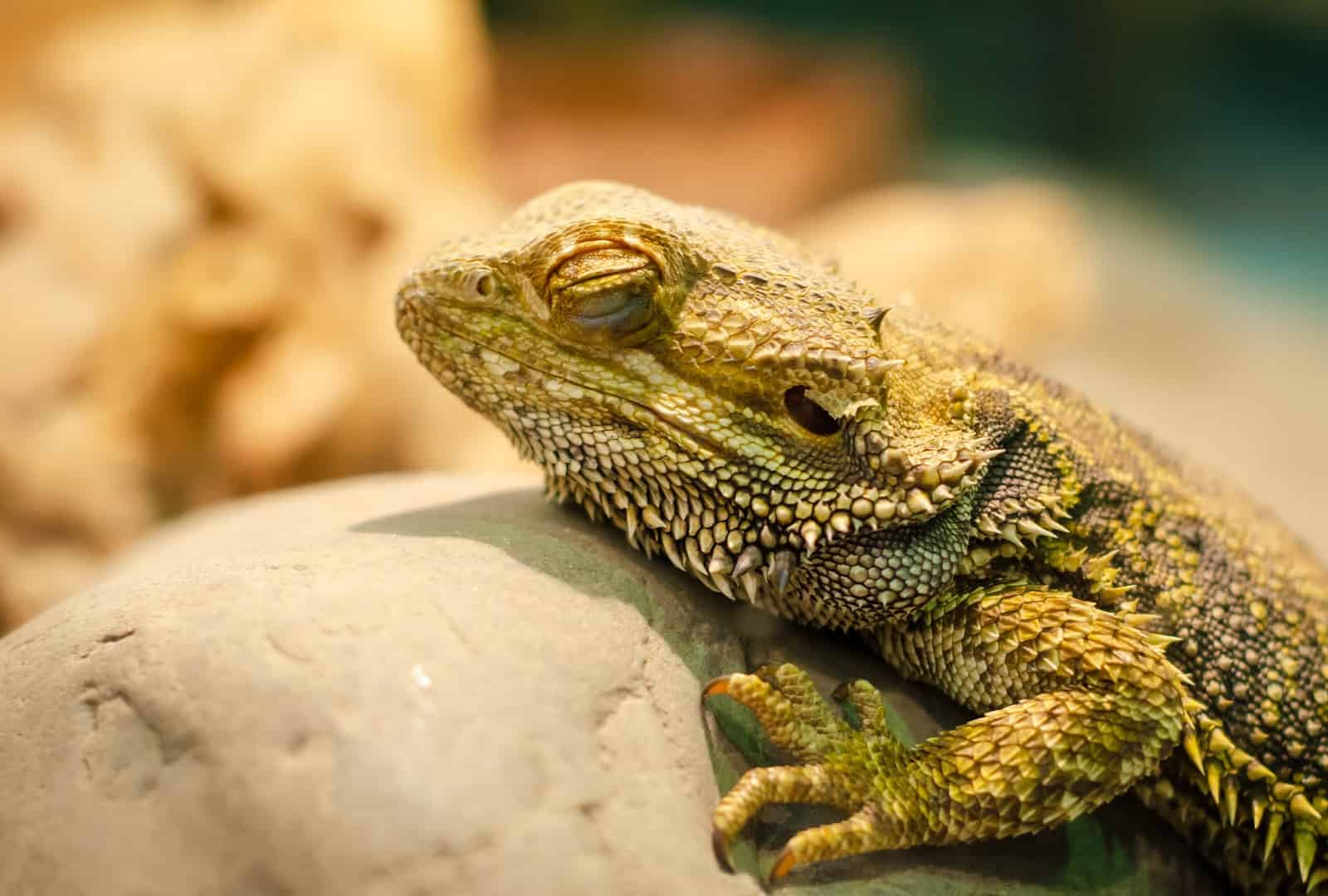How do bearded dragons sleep?
That’s a question that many new owners of both mature and baby beardies ask, especially when they notice them snoozing upright!
This is just one of a few quirky sleeping habits that these lizards have.
So let’s find out exactly how beardeds catch their Zs!
Check: Bearded Dragon Waving: What Does it Mean?
Table of Contents
When Do Bearded Dragons Catch Their Zs
Bearded Dragon snoozing habits are similar to those of humans.
These reptiles are diurnal. This means that hours of sleep occur at night, and they’re active during the daytime.
In the wild, they forage for food and do their other daily activities when it’s light outside and sleep at night after the sun goes down.
How They’re Similiar to Us
Interestingly, these reptiles have been shown to have two cycles in common with mammals and birds: slow-wave and REM sleep.
REM, or rapid eye movement, sleep is characterized by random, rapid eye movements and low muscle tone throughout the body.
Slow-wave sleep is a deep sleep considered to be the most restorative sleep. It’s characterized by more delta wave activity – the slow waves.
What makes this so interesting is that sleep in reptiles other than Bearded Dragons has not been shown to behave quite so much like mammals and birds.
Differences
Your Dragon needs lots of sleep – substantially more than you do, in fact.
In general, these reptiles sleep for 8-12 hours of sleep per day, and they awaken easily if they detect light.
Baby Bearded Dragons require even more sleep than that! It’s important to make sure their terrarium, tank, or cage as dark as possible when it’s time to go night-night.
While REM and slow-wave patterns are present in these lizards just as they are in mammalian sleep, there are some other differences outside of how much snoozing they need compared to humans.
Their sleep cycle is substantially shorter and far more regular than that of humans.
In fact, it’s only 80 seconds long, with the time split evenly between slow-wave and REM cycles.
How Do Bearded Dragons Sleep
In general, Bearded Dragon sleep is similar to ours – in the dark and on their bellies.
Interestingly, they can sometimes adopt positions that we might find odd for a variety of reasons.
Some of these reasons are perfectly normal, for example, relating to their wild ancestors or brumation.
However, sometimes, it can mean a lack of energy from poor food, ambient temperatures that are too low due to the season or a poor heat lamp, or nighttime temperature that is too low for the same reason.
MUST READ: What Does it Mean When a Bearded Dragon Opens its Mouth?
1. Upright
In the wild, it’s not uncommon for the Australian Dragon, as it’s also known, to snooze away in a tree. Often times, they’ll be in an upright position.
Obviously, these lizards don’t have trees in their enclosure, so you might catch them napping upright against the glass.
Usually, there’s nothing to worry about. However, it can sometimes be an indication that the ambient temperature of their terrarium isn’t warm enough.
Be conscious of providing enough heat at night.
If the heat is right, you shouldn’t be worried at all about this upright position.
Some of these guys simply like being pressed up against the glass of their enclosure. There’s nothing to be concerned with.
ALSO CHECK: Bearded Dragon Photos
Covered in Sand
What do bearded dragons like to sleep on?
Bearded Dragons will often cover themselves in the sand while they venture off to dreamland. This is typically a totally natural behavior.
In fact, most Beardies do it occasionally, and some do it all the time.
Ensure that temperatures are ideal in the tank, there is little to no light filtering into the tank at night.
Also, make sure that your Beardie isn’t hiding from a more dominant tank buddy.
If all of those boxes are checked, there’s no need to worry.
READ MORE: Does a Bearded Dragon Bite Hurt?
Slow Breathing While Sleeping
Some first-time owners panic when they come upon their snoozing Beardie and find that its breathing is so slow, they can’t tell if it even IS breathing.
This is perfectly normal. Like all reptiles, the Australian Dragon’s metabolic and respiratory rates drop dramatically when they aren’t awake.
One caveat here is that if your Dragon seems sluggish during the day and is breathing very slowly at night, it could be a sign of impaction or another health issue.
Definitely take him to the vet to be checked out.
Remember an ounce of prevention is worth a pound of cure, especially when it comes to reptiles and lizards, as they can be difficult to treat.
Brumation
Brumation is basically hibernation for reptiles, and it’s a perfectly normal part of your buddy’s life.
During the winter months when nighttime temperature and ambient temperatures, in general, are colder, Beardies enter brumation.
One of the other reasons brumation occurs is if food becomes scarce.
If you’ve forgotten to feed your Beardie – and hopefully you haven’t – or if they haven’t eaten enough – which can happen – your Dragon might begin the brumation process.
Brumation is a natural occurrence and should be no cause for alarm.
It’s important for new owners to know that this exists, though, because during this time Dragon’s sleep habits drastically change.
During the brumation period, sleep time increases drastically. In fact, their sleep patterns change from 8-12 hours to days, weeks, or months, at a time.
While brumation is a perfectly natural part of a Dragon’s life cycle, Baby Bearded Dragons should not go into brumation, as it can stunt their growth.
This is an uncommon occurrence, so it’s not something to worry too much about.
However, if your Baby Bearded Dragon does try to go into brumation contact your vet to see how and if you can stop it.
ALSO CHECK: Bearded Dragon Venom
Final Thoughts
So how do Bearded Dragons sleep? However, they want, really. Just like humans, other mammals, and birds, Dragons catch their Zs in whatever position suits them.
So if you come upon your little guy splattered up against the side of his tank, buried in sand, or in another odd position, don’t fret.
Likewise, if your Beardie is sleeping for days, weeks, or months at a time due to brumation, don’t be concerned about that either.
The only time to really be concerned is if your Dragon is exhibiting an odd sleep pattern alone or coupled with lethargy or a general change in its activity level.
If you notice this, contact your vet immediately to ensure that nothing more sinister is lurking about.
Remember, Bearded Dragons are reptiles, and as such, they are prone to sleeping longer, more deeply, and of course for months at a time, during brumation.
Remember that and don’t panic about your Dragon’s adorable weird sleep patterns.


